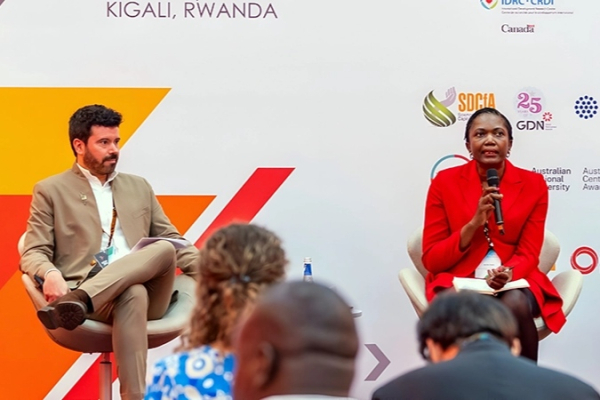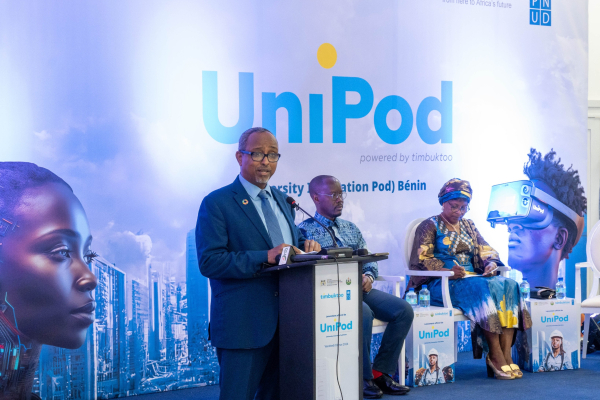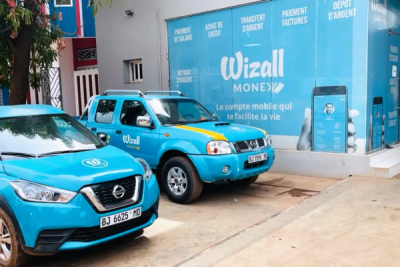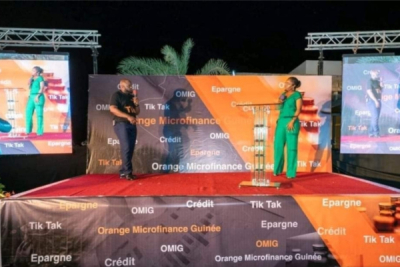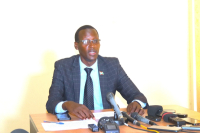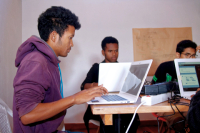Information and Communication Technologies (ICTs) offer a powerful engine for progress across Africa. Their potential to improve governance, stimulate economic growth, and drive social development is undeniable. Recognizing this, African governments have a critical role to play in embracing these technologies and adapting to the transformative changes they bring.
SciTech DiploHub, a Barcelona-based organization specializing in science, technology, and international affairs, announced the launch of a Scientific Diplomacy Center for Africa in Kigali, Rwanda, on May 6th.
This new center is a hub designed to foster collaboration among various stakeholders. Scientists, diplomats, policymakers, tech entrepreneurs, and multinational companies will all come together to promote collaborative research and technological development initiatives across Africa.
"The launch signifies a strategic move," declared Alexis Roig (CEO, SciTech DiploHub), pictured left. "It aims to solidify international collaboration between leading research institutions, universities, and companies within Africa's burgeoning scientific and technological landscape."
The project is spearheaded by SciTech DiploHub and boasts a robust network of partners. This includes the municipal governments of Barcelona and Kigali, the Rwandan government, the Network of African Science Academies (NASAC) representing over 30 academies continent-wide, and the Association of African Universities encompassing over 400 universities in 50 African nations. Additionally, over 30 Spanish universities, organizations, and research centers affiliated with SciTech DiploHub will contribute to the initiative.
The project is propelled by an initial investment exceeding 3 million euros, secured through contributions from founding institutions and co-financing funds provided by the European Commission, aligned with the African Union - European Union Innovation Agenda.
Over the initial three years, the Center plans to train over 2,500 African professionals in the nuances of scientific and technological diplomacy. Additionally, it will support the development of innovative science policy strategies for roughly 20 national and local governments throughout the region.
Samira Njoya
Various initiatives have been implemented in recent years to foster technological innovation in Africa. One of them in Timbuktoo, which was launched last January at the World Economic Forum in Davos, Switzerland.
On Friday, May 3rd, Beninese authorities and the United Nations Development Programme inaugurated the University Innovation Pod (UniPod), an innovation hub located on the campus of Abomey-Calavi. The goal is to help young people express their creativity and talents by bringing innovation projects to life.
"UniPod Benin arrives at a perfect moment," said Félicien Avléssi, Rector of the University of Abomey-Calavi. "It undoubtedly serves as a true engine of development for our university. This hub's contributions will be crucial in achieving our ambition to remain at the forefront of technological innovation in Benin and Africa."
The UniPod complex offers a comprehensive space for young innovators. It features a coworking space, a design lab equipped with computers featuring specific professional software and 3D printers to facilitate industrial and electronic design projects, a makerspace that brings together several manufacturing workshops with appropriate equipment, and a technology transfer office that will protect innovation and bring it to market or closer to industry and the private sector.
The implementation of this project is part of the Timbuktoo initiative, which aims to mobilize and invest $1 billion in catalytic and commercial capital to fill critical gaps and support the startup ecosystem on the continent. With the rise of challenges in securing funding for African startups, initiatives like UniPod are crucial for fostering a vibrant landscape of technological innovation on the continent.
Apart from Benin, 15 African countries are expected to host Unipods. They are notably Mali, South Sudan, Malawi, Rwanda, Uganda, Mauritania, Sierra Leone, Togo, Liberia, Lesotho, Guinea, Zambia, The Gambia, Burkina Faso, and Gabon.
Adoni Conrad Quenum
After working in the mobile money sector for several telecom operators in West Africa, two tech entrepreneurs ventured into the same market in the mid-2010s by establishing a fintech company.
Wizall Money is a fintech solution established by a subsidiary of Groupe Banque Centrale Populaire. It offers both individuals and businesses access to a variety of financial services. Headquqrtedred in Dakar, it was founded in 2015 by French entrepreneur Sébastien Vetter and Congolese entrepreneur Ken Kakena.
Wizall Money includes a mobile app that’s available on both iOS and Android platforms, with the Android version boasting over 100,000 downloads. Once the app is downloaded, users can set up an account and gain access to a wide range of services. The Wizall Money Pro feature allows businesses to pay employee salaries, settle bills, collect payments, and carry out bulk payments.
The startup explains, “If your employee has a Wizall Money account, the funds will be directly deposited into their account. If they don’t have an account, they’ll receive a withdrawal code via SMS. All withdrawals with Wizall Money are completely free.”
Individuals can use the Wizall Money feature to send money to family members, regardless of whether they have a Wizall Money account. They can also pay merchants with just a few clicks, buy airtime, and settle electricity and water bills, among other services.
Like many other fintech startups in Africa, Wizall Money has a network of agents that make its services more accessible. In addition to Senegal, the startup operates in Côte d’Ivoire, Burkina Faso, and Mali.
Adoni Conrad Quenum
Across Africa, microfinance has the potential to be a game-changer for financial inclusion. These institutions offer services that can empower vulnerable individuals by providing them with a safety net against life's unexpected challenges.
On Friday, May 3rd, telecommunications operator Orange Guinea officially launched Orange MicroFinances Guinée (OMIG), its microfinance program. This initiative leverages Orange Money to deliver accessible and inclusive financial services to local communities.
"Credit and insurance remain underutilized within mobile financial services, despite their vast potential for African populations," explained Ousmane Boly Traore, CEO of Orange Guinea. "Through OMIG, we aim to empower micro-entrepreneurs, particularly women, by offering them credit and savings solutions tailored for success, wherever Orange Money operates."
OMIG will provide a range of services accessible through the Orange Money app or USSD menu, targeting micro-entrepreneurs and those without access to traditional banking. This includes loans, money transfers, and savings options. These services aim to simplify and streamline business development and financial goals. Customers will benefit from a fully digital experience, competitive loan and savings rates, and the ability to manage repayments, accounts, and track loans directly within the app.
By introducing OMIG, Orange aims to drive financial inclusion and economic growth in Guinean communities. The diverse services offered by OMIG are expected to further encourage and stimulate entrepreneurship within the country.
Samira Njoya
By streamlining cross-border payments and reducing reliance on third-party currencies, initiatives like these promote financial inclusion and stability. Moreover, they pave the way for greater investment, innovation, and collaboration in key sectors, ultimately driving sustainable development across the continent.
India and Ghana have decided to fast-track the linkage of India’s Unified Payment Interface (UPI) with Ghana’s Interbank Payment and Settlement Systems (GHIPSS). This will facilitate real-time fund transfers between users in both nations within a six-month timeframe. The decision was made during a Joint Trade Committee (JTC) meeting held in Accra from May 2-3.
This step is a part of India’s broader strategy to globalize its UPI system, which has already made its mark in countries such as France, the UAE, Sri Lanka, and Mauritius.
The JTC meeting also brought to the table potential agreements on digital transformation solutions and the adoption of the Local Currency Settlement System (LCCS) under the African Continental Free Trade Agreement. The LCCS is designed to enable cross-border transactions in local currencies, thereby reducing dependence on third-party currencies.
The meeting identified several sectors for increased bilateral trade, including pharmaceuticals, healthcare, ICT, agriculture, renewable energy, and digital infrastructure.
According to the World Bank, in a press release dated April 28, 2022, Ghana stands out as a digital frontrunner in Sub-Saharan Africa, with its digital sector demonstrating robust growth, averaging 19 percent annually from 2014 to 2020.
The 2020 Payment Systems Oversight Annual Report by the Bank of Ghana reveals that the Ghana GhIPSS experienced a 103% surge in processed transactions by the end of 2020. The platforms handled a total of 77 million transactions, double the 2019 figure of 38 million. This surge suggests a shift towards digital transactions, highlighting the increasing adoption of digital financial services and the expanding digital economy in Ghana.
Hikmatu Bilali
She is a digital transformation consultant, a trainer, and a coach in digital skills. Her goal is to help businesses operating in Africa stay informed and grow their operations.
Jemila Abdulai (photo) is a Ghanaian blogger and entrepreneur. As the founder of Circumspecte, a digital platform and consultancy firm, she provides a wealth of information, inspiring experiences, and creativity-focused services.
Founded in 2007, Circumspecte is more than just a development consultancy. It supports digital transformation and skill development in Ghana and beyond. Within Circumspecte, Jemila Abdulai not only serves as the founder but also as a digital transformation consultant and trainer in digital skills. Her goal is to inspire creative and meaningful actions across the African continent.
Since its inception, Circumspecte has trained over 1,000 Africans in digital skills and also offers communication services. Moreover, the company organizes and covers digital events, contributing to the vibrancy of the digital landscape in Ghana and across Africa.
Mrs Jemila also serves as Head of Digital and E-commerce at Stanbic Bank Ghana. In this role, she engages stakeholders throughout the digital platform value chain to ensure optimal functionality for all clients, whether consumers or high-net-worth individuals.
The Ghanaian entrepreneur holds a bachelor's degree in economics, earned in 2008 at Paul Valéry University in Montpellier, France, and a master's in international economics and business from Johns Hopkins School of Advanced International Studies (SAIS) in Washington, D.C., in 2013.
Her professional career began in 2009 at Devex, where she was a correspondent covering international development. In 2010, she was appointed Regional Program Coordinator at the African Women's Millennium Initiative. In 2011, she worked as a Partner Support Associate at Esoko, a tech company that provides mobile and web-based solutions.
In 2012, she joined the African Center for Economic Transformation (ACET) as a communications consultant. In 2013, she became a research consultant at the World Faiths Development Dialogue, an organization that fosters dialogue among global organizations. From 2013 to 2015, she worked as an Operations and Communications Assistant for the African Community of Practice (AfCoP) project at the African Development Bank.
Her influence and dedication have been recognized repeatedly. In 2018, she was named one of the 50 Most Influential Young Ghanaians by Avance Media, and in 2020, she received the prestigious Presidential Award for Excellence in Digital Media in Ghana. In 2021, she was named a Digital Skills Champion by the Coalition for Digital Equality.
Melchior Koba
The Burundian government has pledged to modernize services offered to citizens. However, several regions of the country still lack comprehensive internet coverage and digital skills, limiting access to digital services in these areas.
On Monday, April 29, the Ministry of Communication, Information Technology, and Media announced the launch of a national survey on ICT access and usage among households, businesses, and public administrations in Burundi. This initiative aims to assess the state of digital service usage and access while identifying the knowledge and needs of the Burundian population.
According to Thierry Kitamoya (photo), Assistant to the Minister for ICT, this survey is part of the Digital Economy Foundations Support Project (PAFEN), financed by the World Bank to the tune of $92 million. The PAFEN aims to expand broadband internet access for underserved populations, enhance the government's capacity to provide digital services, and lay the groundwork for accelerated digital economy development in Burundi.
The survey, which began on April 29, will continue until May 17, led by the Burundian Center for Population and Development Studies (CERPED) and the Tunisian company SFM Technologies. The survey will target varied samples across different communes and provinces to provide a comprehensive overview of ICT access and usage in Burundi.
The survey results will inform the design and goals of digital access programs, the formulation of new broadband policies, and the assessment of ICT penetration levels in Burundi.
This innovative solution is designed to help two groups of people: those seeking safe and affordable rides without a car, and drivers looking to share travel costs with reliable passengers.
Nabhorelan, a Guinean startup, has developed a carpooling solution that allows users to share rides with others traveling in the same direction or to the same destination. The startup, based in Conakry, was established in 2022 by founders Diallo Aissatou Bailo and Diallo Thierno Mamadou Oury.
“Our platform bridges the gap between passengers and drivers who have a shared objective: reaching the same destination. We ensure a safe and convenient travel experience in terms of cost and comfort by assisting you in finding the journey that aligns best with your needs,” the startup explains.
The Nabhorelan solution includes a mobile app, available on both iOS and Android platforms. After installing the app, users create an account to access a variety of services. Users wishing to also have a driver profile are required to provide their ID, driver’s license, or the vehicle’s registration certificate for account validation.
To book a ride, travelers input their journey details, such as departure and arrival cities, departure date, and the number of travelers, into the search bar. The platform then displays available trips. Drivers have the option to approve the ride if the conditions suit them. Also, drivers can post their route and set their prices. Passengers can then decide whether to accept the offer based on the driver’s terms. If both parties agree, a meeting is arranged.
Adoni Conrad Quenum
His primary goal is to help all types of businesses, whether small or large, thrive in Africa. To achieve this, he leverages his digital expertise to create innovative solutions tailored to every user’s needs.
Brice Gboyou (photo) is a Beninese developer, designer, AI specialist, and entrepreneur. As the founder and CEO of All Web Service, he provides digital services to businesses.
All Web Service, a digital production agency founded in 2015, aims to be a catalyst for business digital transformation. Over nine years of operation, it has successfully completed several projects, including Afriyo, Artiweb, Aginap, Kloo, WaChap, and Agodjié, benefiting over 200,000 clients.
Afriyo is an app that offers one-click access to a variety of services, products, companies, and people using artificial intelligence, simplifying e-commerce across Africa. Artiweb, on the other hand, serves as a community and social network for web professionals in Francophone Africa, providing tools, resources, training, and professional opportunities.
Aginap is an application that simplifies marketing, sales, and customer relationship management via a multichannel chatbot powered by AI, present on platforms like WhatsApp, Messenger, Facebook, Instagram, Telegram, Viber, SMS, Voice, and websites. Kloo is a platform that facilitates information sharing and online sales. It allows the creation of links and pages in various formats and generates dynamic QR codes to share information and access statistics.
WaChap is a web application that automates WhatsApp marketing, helping e-merchants optimize sales and manage conversations and customer relationships efficiently while saving time through chatbot features. “With WaChap, you can set up a chatbot or robot to automatically respond to incoming messages, improving customer service efficiency and maintaining consistent engagement with your customers. Nobody likes to wait,” Brice Gboyou said in 2023.
Agodjié is a virtual personal assistant. Using AI and accessible via WhatsApp, Messenger, Telegram, and Instagram, it answers questions across various fields.
All these solutions, offered as software services (SaaS) and developed by Brice Gboyou and his team, aim to help businesses increase their visibility and revenue through the opportunities provided by the digital world.
Melchior Koba
Access to high-speed internet connectivity is now indispensable in Africa, where digital transformation is accelerating. However, the high cost of internet remains a significant barrier for a population eager to take advantage of new technologies.
The Malagasy government has rescinded its recent decision to raise the price of a gigabyte of data to $0.95, reversing a policy introduced last month. This U-turn was announced by the Ministry of Digital Development, Posts, and Telecommunications (MNDPT) in a statement following a review of internet service providers' pricing practices in the country.
"The government found that the artificially high prices maintained by telecommunications operators did not reflect the commitments made during negotiations. As a result, this measure aims to restore fair competition and reduce costs for end users," said the MNDPT statement.
Initially, the government had decided to raise the price of a gigabyte from $0.45 to $0.95, justifying this measure by arguing that it would promote a more equitable distribution of internet access across the country. However, this decision made internet access increasingly difficult for many Malagasy citizens, further widening the existing digital divide.
In response to their customers' needs, several providers did not implement the new rates. According to data from Kepios, a consultancy specializing in digital usage studies, Madagascar had 3.8 million social media users as of January 2024. Following the price hike, many internet users were forced to cut back on their internet-related expenses or visit cybercafés, thus turning what was once a widely accessible service into a luxury product in Madagascar.
The suspension of this decision is expected to pave the way for new discussions between the government and the country's mobile operators. A potential reduction in prices should help liberalize the market and allow various users to reconnect with the internet, which is a crucial tool for students, traders, and local startup founders.
Samira Njoya
More...
Ghanaian healthtech DrDoGood has launched a Diabetes Management Program to support 5,000 Ghanaians with diabetes
The program provides educational resources, community support, and access to healthcare professionals, covering topics like diabetes management, nutrition, exercise, and mental health. Regular support group meetings and recognition initiatives are part of the community support.
Members can access healthcare professionals for personalized guidance and regular health monitoring.
A computer scientist by training, he's passionate about building tech solutions that empower businesses. His expertise has fueled the design of hundreds of digital projects.
Wassel Berrayana (photo) is a Tunisian entrepreneur and the founder and CEO of Proxym Group, which provides digital services across various sectors in Europe, the Middle East, and Africa. Established in 2006, Proxym Group is a digital services company focusing on connectivity and information systems in the financial (banks, microfinance, and insurance) and governmental sectors. Its primary mission is to assist financial and governmental institutions in their digital transition.
Proxym Group is also recognized as a digital solutions integrator. Through its subsidiary, Bankerise, it offers ready-to-use applications designed to help banks increase their conversion rates, retain customers, and reduce financial expenditures. The goal of this digital banking engagement platform is to ease the transition of retail and corporate banks into the digital era.
To date, Proxym Group operates in over 20 countries, employing more than 250 digital consultants across five centers of excellence worldwide. The company claims to have completed more than 400 digital projects.
Wassel Berrayana graduated from Grenoble INP – Ensimag in 1996 with a master's degree in computer science. He also holds a master's degree in management and international business. He began his professional career in 1996 at TELNET as a computer engineer and joined Hewlett-Packard (HP) in 1998 as a telecom engineer.
From 1999 to 2003, he worked at Sun Microsystems, a subsidiary of Oracle Corporation, where he held positions as a telecom and network engineer, as well as a Java software developer. From 2003 to 2006, he worked as a pre-sales engineer and sales support at the French technology company specializing in customer relations, Eloquant.
Melchior Koba
Misr Digital Innovation (MDI), a Banque Misr subsidiary, has received initial approval from the Central Bank of Egypt to launch ‘onebank’, Egypt’s first digital bank.
The online-only bank aims to enhance financial inclusion and accessibility in Egypt. The official launch is expected in the last quarter of 2024, promising a more digitally-driven financial future for the country.
Inspired by a service he found incredibly useful during his time in the Middle East, a tech entrepreneur returned to his home country to launch Fikaso Plus.
Fikaso Plus, a mobile application developed by the Malian startup Fikaso, offers a solution for residents of Bamako to order food from local restaurants and have it delivered. The startup, founded in 2019 by Mahamadou Cissé, was born out of a simple observation.
“During my stays in Mali, I often struggled to find food, either due to a lack of knowledge about the available restaurants or the desire to avoid the city’s notorious traffic,” Cissé explains. “The real catalyst, however, was during a visit to the Near East, specifically Abu Dhabi, where I became accustomed to using a food delivery app.”
The Fikaso app, available on iOS and Android –already downloaded more than 5,000 times– addresses this issue. After downloading the app, users create an account with their personal information. They can then browse partner restaurants on the platform to place their order. Users input their commune and neighborhood into the search bar to receive a list of relevant restaurants based on their geographic location.
By selecting “Commandez maintenant (Order Now),” users can view the menu, dish prices, restaurant operating hours, and reviews from other users. Fikaso Plus also features a digital wallet for paying restaurant bills and delivery fees.
In addition to food orders, Fikaso offers other services such as parcel delivery and on-demand mobility. Users can order a taxi or motorcycle taxi online for errands. The startup plans to expand to other cities to support its growth in the local market before potentially venturing overseas.
Cissé believes in the power of technological innovation. “Technological advancements level the playing field; so-called underdeveloped countries can benefit from the same progress as developed countries. As such, African youth should not merely be playing catch-up; they should be leading the charge,” Cissé says.
Adoni Conrad Quenum


